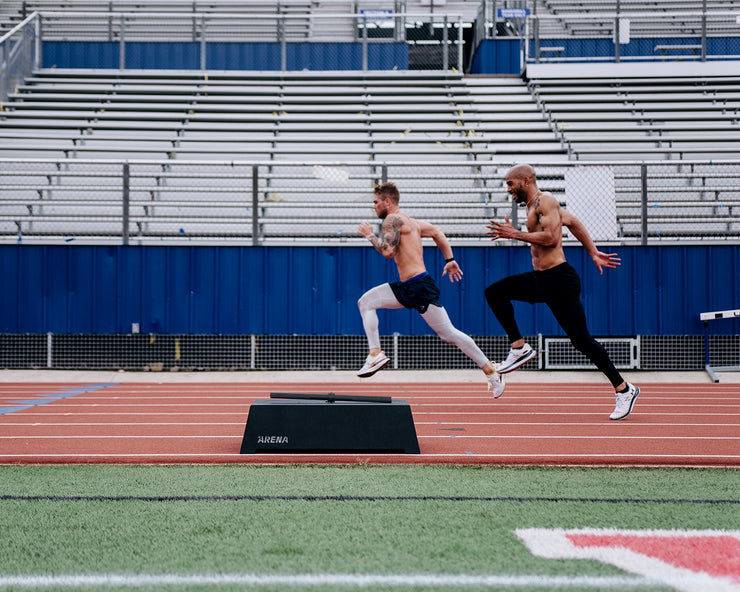
I once asked a friend who had just completed a marathon, “What’s the hardest part of preparing for a marathon?”
His answer? “all of it.”
You don’t just show up on race day and plan to grit through it. Sure, grit’s part of it, but you also have to put in the hours, the miles, and develop the mindset it takes to set yourself up for a successful 26.2 miles as a runner.
The following article covers 7 key factors to work smarter AND harder to get the best possible outcome on your marathon race day.
1. Establishing a Consistent Training Schedule for Marathon Training
Consistency is undefeated.
Pounding the pavement is by far the most important piece of any training program (you are running a marathon after all).
Setting up your schedule day to day to prioritize this is vital. That means picking a time slot that you are 100% confident you can commit to everyday.
Generally, research shows that evening is the ideal time for boosted performance. The biometrics during this time signal that the body is “settled” into the day and you can strategically approach whatever your fueling needs are leading up to training.
However, the bottom line is the time frame that works for YOU is the most optimal – morning, afternoon or evening.
And as mentioned above, consistency is undefeated – consistency in your training far outweighs the minor benefits of evening training.
To help keep you consistent and enhance your cross-training, number 5 on this list, make sure to invest in solutions that save you time. The Arena Platform is ideal for this because it can fit into any routine or schedule and give you time back in your day. You can take the ARENA to the track, on the road, or wherever you are going to be without needing a plug. This makes your schedule even easier to dial in.
One thing to note -- If possible, leading up to your race, get in the habit of doing your training session at the time the competition will be held.
For example, if a race starts at 7am and you normally train in the evening, start incorporating sessions at that 7am time slot.
Your body will feel different at different times of the day, so take note and adjust accordingly.
However, don’t make the crucial mistake of sacrificing sleep just to train earlier. Pick your battles and keep reading to understand more about the importance of sleep.
2. Creating Healthy Sleep Hygiene to Run Optimally
The most important thing to remember about sleep is that you cannot overcome sleep deprivation. Optimal sleep is crucial to feeling your best and putting up the best run times.
The research is crystal clear on this. The body of an athlete who is under-slept has to work systemically harder; blood pressure is higher, resting heart rate is increased, perceived exertion increases. We want the opposite of all these things.
Every system in the body is affected by sleep, so a minimum of 7 hours needs to be an absolute priority for optimal levels of physical and cognitive performance. With added physical activity and stress, some athletes may need more than 7 hours.
In addition to sleep duration, your sleep schedule will have a significant impact on performance. Rule of thumb is to try to keep your wake time and bed time within 1 hour of each other every day. This allows a ‘Bonnie and Clyde-like’ alignment between our circadian rhythm and sleep drive cycles – aligned and having each other’s backs.
Consistent wake and sleep times should be accompanied by proper exposure to light – like getting direct sunlight first thing in the morning (and no I don’t mean staring directly at the sun) and limited light exposure in the evening.
The ‘grind culture’ days are coming to an end. Take care of your body, take care of your brain, and set your crosshairs on an airtight sleep schedule.
3. Recovery Protocols for Marathon Running

Recovery doesn’t always mean sitting around doing nothing. A proactive approach to recovery includes both recovering from a prior workload and preparing yourself for the next challenge.
This means incorporating things like cold exposure, sauna, massage, compression, and strategic fueling. I will save protocol details and planning for another day, but looking into these activities will help massively with your training.
4. Load Management to Train Hard and Smart
“Everyone has a plan until they get hit”…well not everyone.
Working hard is just a baseline for success when it comes to marathon training. You also have to be smart about your approach to load management.
Your body is resilient, but it’s also complex. Without a training plan and strategy for the stimulus and load you expose yourself to it is impossible to reach your max potential. A lot comes into play when designing a plan. Energy systems need to be manipulated in a strategic yet aggressive manner to get you to your goals. You are better off working with an expert out of the gate rather than learning the hard way down the road.
Working with a coach to increase performance can be a great start – learning from them and inviting a second opinion and perspective on training.
5. Strength Training for Running Longevity and Supplemental Training

Your strength training should include different variations of curls so you look good on race day. That is it…end of this section.
Just kidding.. but strength training is another often overlooked way to support injury prevention and accelerate performance on race day.
Don’t get it twisted…running is the number 1 priority, but strength training can be designed in a way to increase performance over time without decreasing performance from the run program day to day.
One of the issues we run into with strength training is adding stress to tissues and joints that are often already overused due to the volume of running. To combat this we like to manipulate which types of resistance we use. With the innovation of ARENA, we are able to create variety in the directions in which we load the body. With the cable system, we can apply force to the body in different planes other than the traditional lines of pull gravity provides. This allows us to create a stimulus to boost performance and simultaneously prevent overuse injuries.
Our strength training programs consist of the following:
- Soft tissue maintenance
- Dynamic warmup
- Activation
- Neural prep
- Power
- Strength
- Cool down
Each part of the program serves a purpose and should not be omitted. As a result, efficiency is key since most athletes are already dedicating a chunk of their week to running. Whether you are doing a ‘couch to 5k’ or a world-class runner, strength training will always be your ally.
6. Fueling your Marathon Training with Nutrition
Not that it needs to be stated, but nutrition plays an enormous role both in and out of marathon race preparation.
In general, we follow a few simple rules:
- No skipping meals; this is essential for energy levels and recovery
- Whole Foods > Supplements (supplement where needed)
- Variety is key: eat a wide spectrum of colors due to the different nutrients they entail
- Have a plan: be consistent around your workouts. Don’t try a new strategy on race day. Use the same protocols throughout training to prime your body.
7. Determining Discomfort vs Injury
General aches and soreness are normal aspects of training hard.
Sharp pains can point to a more significant problem. Understanding the difference between the two and how to respond is crucial to keep your training on track.
Things like redness and inflammation are signs of significant issues worth looking at.
Always err on the side of caution and understand that taking a few days off will not completely derail your training. Pushing through an injury could set you back significantly and cause you to miss your race.
Recap
Training for a marathon takes grit, planning, hard work, and persistence. Keeping an eye on the above 7 factors can greatly improve your performance on race day and keep your body and mind from burning out to ensure a long, healthy run career.



